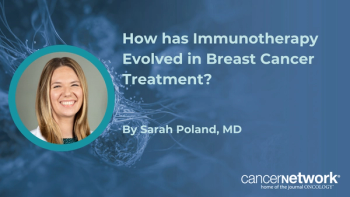
Extended AI Therapy Not Recommended for All HR-Positive Breast Cancers
Extended AI did not improve disease-free survival for all HR-positive breast cancers; however, certain high-risk patients may benefit from therapy beyond 5 years.
Extended aromatase inhibition (AI) following sequential endocrine therapy did not significantly improve disease-free survival (DFS) among women with hormone receptor (HR)-positive breast cancer, according to the DATA study. Subgroup analyses indicated, however, that certain high-risk patients may benefit from AI therapy beyond 5 years.
“Some physicians already prescribe extended AI therapy after 5 years of sequential endocrine therapy, in view of the steadily increased risk of disease recurrence in HR-positive breast cancer for years 5–10 by 5%” and by more beyond that, depending on node positivity, wrote study authors led by Vivianne C. G. Tjan-Heijnen, MD, of Maastricht University Medical Centre in the Netherlands. “However, there are currently no data on the importance of extended AI use beyond a total duration of 5 years for patients treated with sequential endocrine therapy, and earlier introduction of AIs might make prolonged treatment beyond 5 years redundant by increasing the chance of cure.”
The DATA study was a prospective, randomized, open-label, phase III trial conducted at 79 hospitals in the Netherlands. A total of 1,912 women were screened, and 1,860 women were eligible, randomized to either 3 or 6 years of anastrozole; all had postmenopausal HR-positive early breast cancer with no signs of recurrence after 2 to 3 years of adjuvant tamoxifen. Results of the analysis were
After a median follow-up of 4.2 years, the adapted (beginning beyond 3 years after randomization) DFS rate at 3 years was 90.7% with 6 years of anastrozole, compared with 88.9% with 3 years of anastrozole. At 5 years, these rates were 83.1% and 79.4%, respectively, yielding a hazard ratio of 0.79 (95% CI, 0.62–1.02; P = .066).
A post-hoc subgroup analysis did find that extended therapy benefits some patients. The 5-year adapted DFS rate was 84.4% with 6 years of therapy compared with 76.2% with 3 years of therapy in node-positive patients with estrogen receptor– and progesterone receptor–expressing disease, yielding a hazard ratio of 0.64 (95% CI, 0.46–0.89; P = .0075). Patients with large tumor size (≥ T2) also fared better with extended treatment, with a 5-year adapted DFS rate of 82.7% with 6 years and 69.2% with 3 years of therapy, for a hazard ratio of 0.53 (95% CI, 0.53–0.82; P = .0031).
Though there was no difference between the groups with regard to adverse event rates in the first 3 years of treatment, for the full observation period (0–6 years), there was a higher rate of all-grade arthralgia or myalgia in the 6-year group compared with the 3-year group, at 58% vs 53%. The same was true of osteopenia or osteoporosis (21% vs 16%).
“We cannot recommend the use of extended adjuvant AI after 5 years of sequential endocrine therapy to all postmenopausal women with HR-positive breast cancer,” the authors concluded. “However, our exploratory subgroup analyses suggest that patients with high-risk characteristics might benefit from extended therapy, and that tumors expressing both estrogen and progesterone receptors might drive the benefits we observed.”
Newsletter
Stay up to date on recent advances in the multidisciplinary approach to cancer.














































